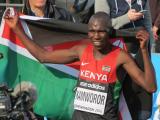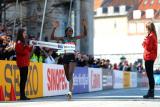Folders |
TF360: Brett Gotcher Eyes Success in BeantownPublished by
Ready for the Streets of BostonBy Scott Bush - Click Here for all TF360 Archives In January of 2010, former Stanford All-American Brett Gotcher shocked the road race world by running a 2:10:36 marathon debut at the Houston Marathon. With expectations on the rise, Gotcher was labeled an Olympic hopeful and spent the better part of the next two years focusing on preparing for the U.S. Olympic Marathon Trials. In Houston in 2012, Gotcher placed an inspiring fifth, just missing the Olympic team, but showed his future in the marathon distance remained incredibly bright. After a couple years of ups and downs, Gotcher is back on track, feeling strong and ready to race the Boston Marathon on April 21. We caught up with the California native recently, discussing his current level of fitness, why he's been rather quiet for the past year and much, much more. Scott Bush (SB): You've been fairly quiet the past bunch of months, although you did run a 1:04:01 half effort at the NYC Half. How training been going for you as you start to really focus in on your last few weeks of Boston Marathon training? Brett Gotcher (BG): I have been very quiet unfortunately. I had a pretty long lay-off in the fall because of a foot problem, so I've been focusing on gradually building back up since last November. Training has been going really well though. It's been a slow process, but I've been seeing improvements and feel like I'm finally building some momentum going into Boston. SB: With Boston just around the corner, I assume you have a decent gauge of your fitness at this point. What are your expectations heading into Boston and what type of early pace are you looking to set? BG: I actually feel like I don't have a good gauge of my fitness at all. I had absolutely no idea what I would be able to run at the NYC Half, and I've been trying not to worry about certain paces I think I should be running. My main focus has simply been on getting as fit as I possibly can and being able to handle the challenges that a course like Boston presents. My main expectations heading into Boston are to be able to compete as best I can against the best in the world and to have a positive marathon experience, and I think that means knowing how to run this course effectively and intelligently. SB: How has training changed this time around compared to past marathon build-ups? BG: This marathon cycle has been less focused on running a certain pace and has been more about preparing to handle what the Boston course will throw at you. Being able to handle a ton of downhill the first half of the race and managing the hilly section from 16-21 miles seem to be the keys to running well in Boston. From what everyone has told me, it's all about having your legs under you so you can run strong through the hills and be able to take advantage of the downhill over the last few miles. SB: Since McMillan Elite split up at the end of this past year, it seems like a lot of athletes have jumped into other groups or moved elsewhere. What's your current training situation? BG: I moved back to Northern California in the fall of 2012. My fiancée and I both grew up in the same town and we knew we wanted to end up here eventually, so we decided it was time to make the move. Fortunately, Greg and I have built a great relationship over the years, so he was willing to continue coaching me from afar. He's been so crucial in my development as a professional runner, I couldn't imagine him not coaching me. It's been a little tough without the daily training partners I had in Flagstaff, but I have complete faith in Greg and myself to be able to get it done. Luckily, Northern California is a pretty amazing place to train, so I'm hoping I can eventually entice a couple other guys to make the move out here... SB: You really burst onto the road racing scene in 2009-2010. What's it going to take for you to get back to that level and beyond in the coming year or two? BG: Consistency. Before I had that breakthrough, I had the best 2 years of training in my life. I never had a serious injury so I was able to constantly build. We didn't do anything crazy, but we put in the work. Once I started running marathons, I got a little more banged up. It's been hard to stay as consistent as I'd like, and it's shown in my performances. It's been a learning process, but I think I'm finally figuring out what I need to do to be able to train and race at the level I know I'm capable of. SB: The marathon continues to get more competitive, both internationally and domestically. Why do you think this is? BG: Guys are moving up to the distance sooner. There's a lot of money in marathons, especially compared to the track. If guys aren't winning medals, they're starting to look at the roads. Domestically speaking, it's awesome. A guy like Ryan Vail, who has run around 27:40 on the track, might not have made the move to the marathon as early as he did 8 years ago. 27:40 8 years ago would have made him one of the best 10k guys in the US, but that just doesn't cut it these days. Instead, he made the decision to move up at a younger age, and now I think he's one our best hopes at being a truly great US marathoner. And the great thing is, there are a bunch of other guys just like Ryan that are ready to make the jump. 2016 could be a very interesting year. SB: What's the best part of being a being a professional distance runner and what's the most challenging part? BG: Honestly, there are 2 great aspects of being a professional distance runner. First, you get to do what you really love every day. Don't get me wrong, there are days when getting out of bed seems like a huge accomplishment itself, but the fact that my office is the forest by my house is pretty cool. The other thing, as sappy as it sounds, is the fact that I've been able to make some amazing friends through this gig. There are the guys at adidas that have always stuck their neck out for me, and there's no way I would be in the situation I'm in today without their help. There's my agent, Dan Lilot, who upgrades me to Business Class on my flight to Boston so I can get more rest. There's Jason Hartmann, who gave me a ton of advice on the Boston course (the same course he finished 4th place on the last 2 years) when we were roommates for the NYC Half. It's relationships and friendships like these that make being a professional runner pretty special. The most challenging part is convincing your significant other (not a runner) that you're as tired as you really are. More news |









